Research
More in this issueInsights into SARS-CoV-2 Genome Sequences
In March 2020, a team of microbiologists at LAU, led by Chair of the Natural Sciences Department in the School of Arts and Sciences Sima Tokajian, discovered a variation in part of the genome of two recovered SARS-CoV-2 viruses – focusing on the ORF3a protein.
She worked with LAU biology alumni Tamara Salloum (BS ‘13, MS ‘15), Balig Panossian (BS ‘17, MS ‘19) and Georgi Merhi (MS ‘19), and senior undergraduate biology student Elio Issa to further research the virus’ sequenced genomes. Their efforts could potentially pave the way for understanding how the virus evolves and behaves.
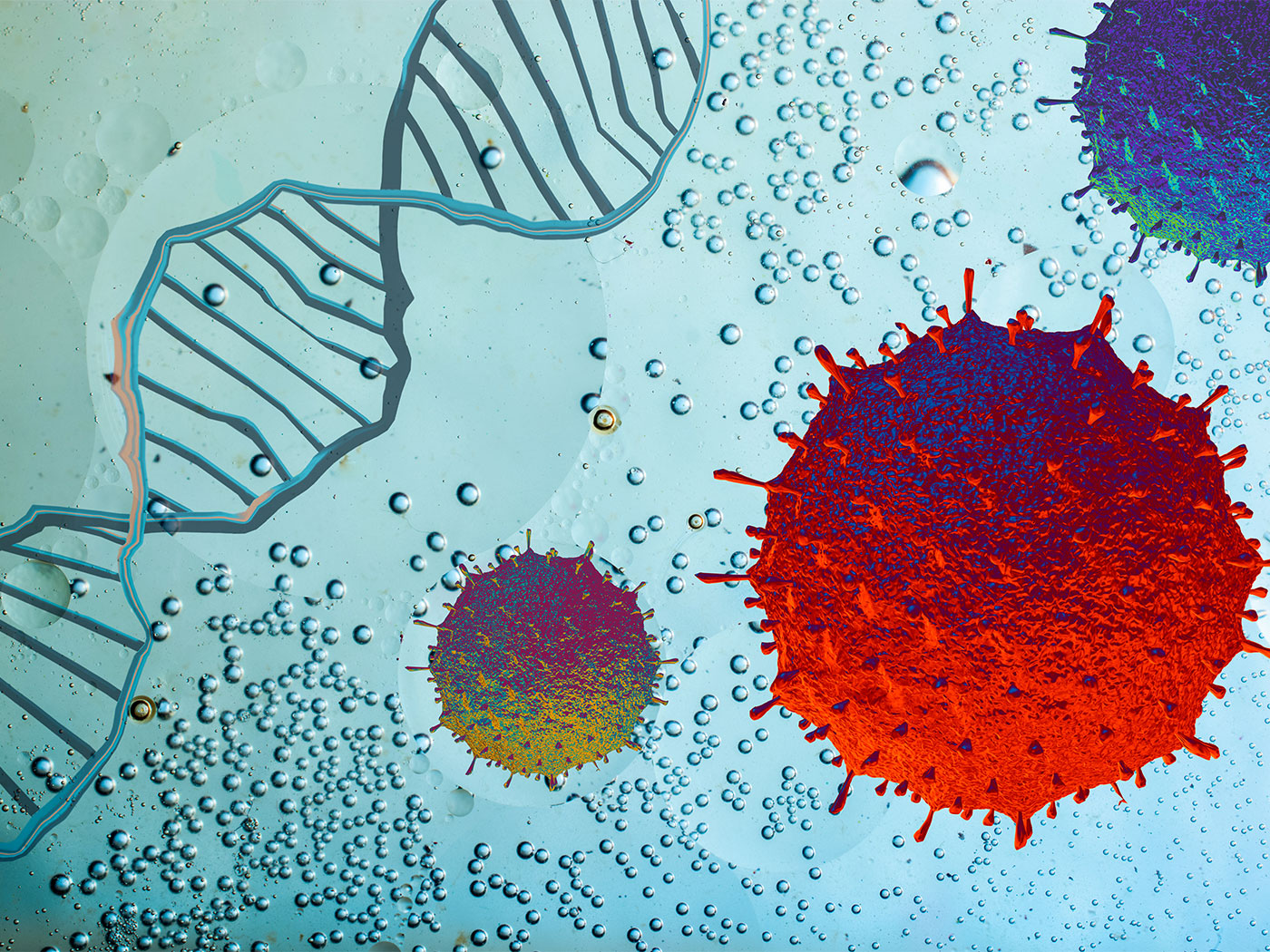
Dr. Tokajian heads a pathogenomics lab at LAU equipped with the most novel tools in microbiology for whole-genome data generation and analysis. Using a variety of bioinformatic tools, the team dug deeper to confirm their observations, which were published in the American Society for Microbiology Journals.
Twitter, Lies, and COVID-19: Defeating the Coronavirus Infodemic
In an editorial, School of Arts and Sciences Dean Cathia Jenainati reviewed the preliminary findings of a study by Associate Professor of Computer Azzam Mourad investigating the ways that social media platforms have reflected the public’s response to the COVID-19 pandemic, giving rise to an infodemic.
SoAS Associate Dean Haidar Harmanani provided the quantitative analysis of the primary data, while graduate computer science student Ali Srour contributed to the project.
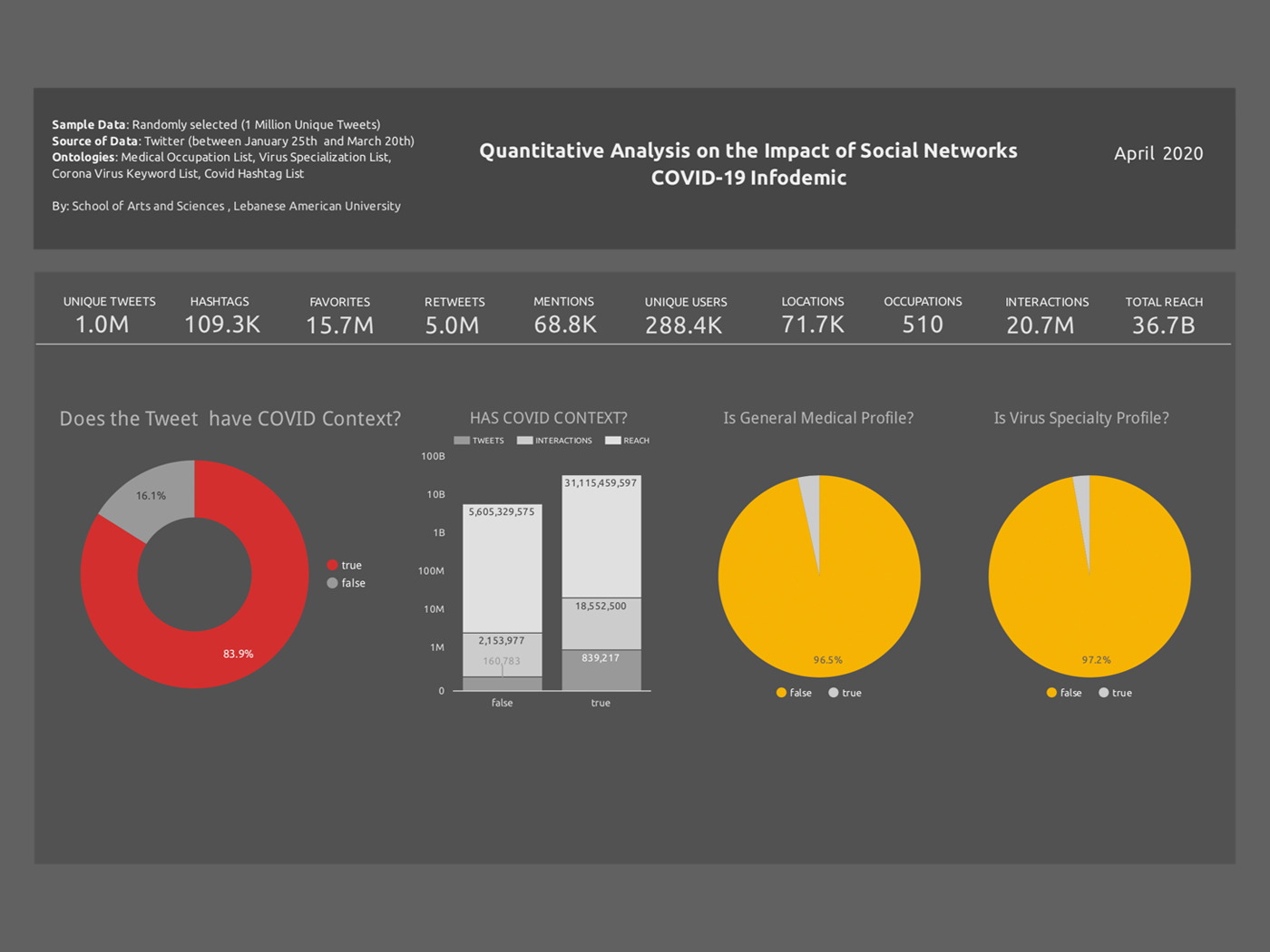
The study tracked 1 million tweets initiated by 288K unique tweeters over a two-month period and found that most of the related tweets, 53.5 percent, used the COVID_19 hashtag. A thorough analysis on the context of these tweets concluded that 16.1 percent are not in fact related to the pandemic and had exploited the hashtag for advertisement purposes such as selling fake coronavirus cures as well as propagating malicious links and contents including cyberattacks on critical information systems.
COVID-19: Global Testing and Genomic Variability
Associate Professor of Bioinformatics Georges Khazen and a team of faculty and students in the School of Arts and Sciences have developed an interactive dashboard for validated historical testing data about COVID-19.
The testing data could be used by the Ministry of Public Health, as well as healthcare professionals, to track the pandemic, prepare for potential surges in infection rates, and plan mitigation strategies accordingly. A genomic variability section further provides insights on how the virus is changing within and between countries.
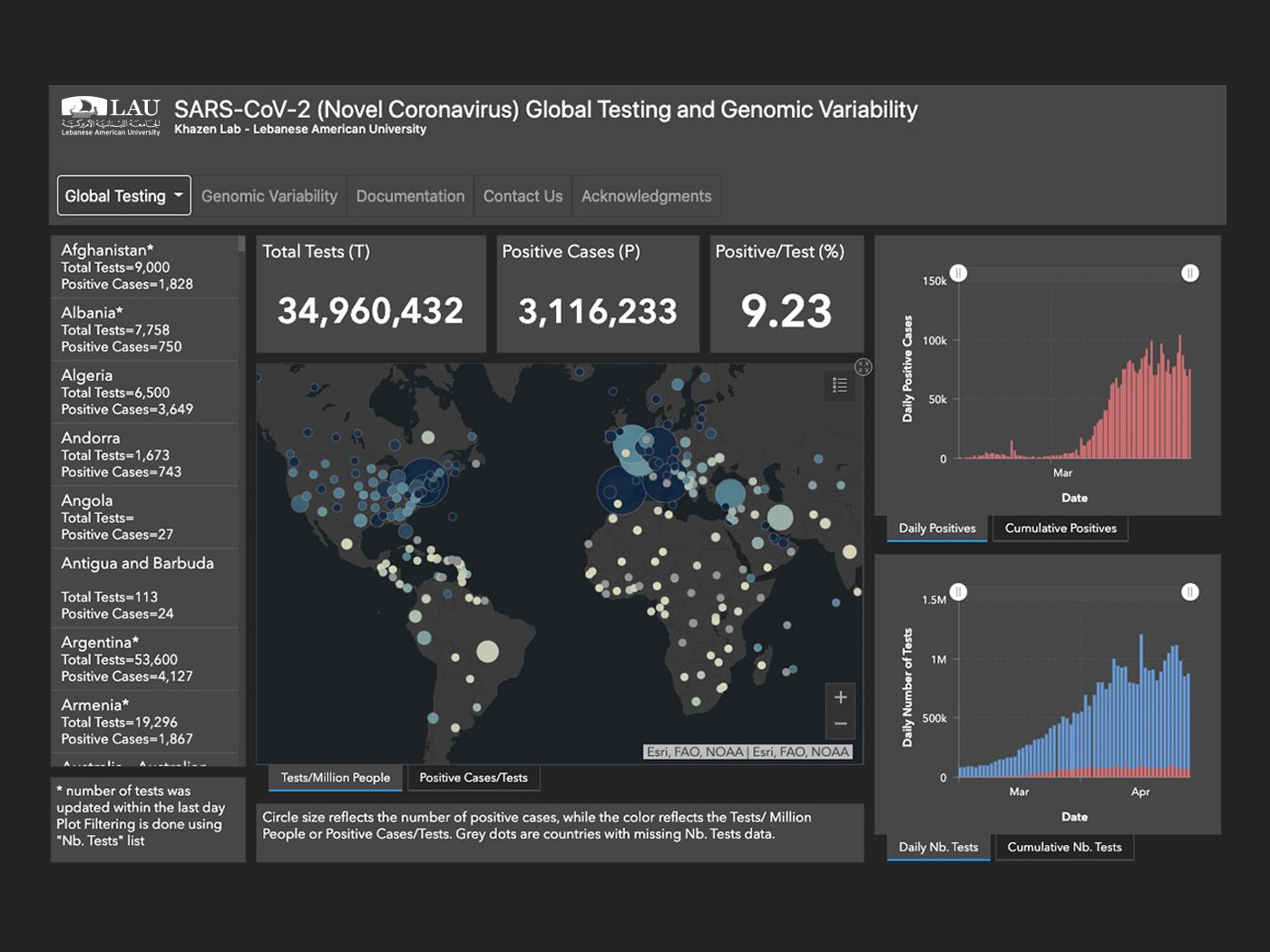
The team includes post-doc fellow at LAU’s Gilbert and Rose-Marie Chagoury School of Medicine Halim Tannous, post-doc fellow in the Department of Computer Science and Mathematics Rasha Boulos and Senior Data Scientist Shadi Akiki. Dr. Khazen also recruited the help of seven undergraduate students majoring in Bioinformatics and Computer Science to assist in the data collection.
People Trust Feelings Over Cold Hard Facts in Times of Crisis
Assistant Professor of Marketing at the Adnan Kassar School of Business (AKSOB) Omar Itani co-authored a study that examines how and why people tend to base decisions on anecdotal information rather than facts when feeling anxious and vulnerable. Its conclusion was consolidated by the quick upsurge of the COVID-19 pandemic.
The study, published in the Organizational Behavior and Human Decision Processes, uses meta-analytic techniques to explore the impact of evidence type on persuasion in 61 studies with 160 samples and 32,321 observations. Featured in Forbes, the research paper reached the top 5 percent and 98th percentile of all research output ever tracked by Altmetric.
Although the study found that statistical evidence exerts a greater impact on persuasion in general, people are susceptible to anecdotal bias when an issue pertains to oneself, involves a severe threat, and relates to health, such as the present medical emergency caused by COVID-19.
COVID-19: Extreme Social Distancing Can Save 150,000 Lives in Lebanon
In response to the Novel Coronavirus COVID-19 outbreak, the Office of Graduate Studies and Research at LAU compiled data forecasting the impact of the pandemic in Lebanon, and the level of social distancing measures to contain it.
The forecast of the daily number of infected cases, recoveries and deaths due to COVID-19 in Lebanon was projected in a window of 112 days, beginning March 19 and ending by end of June 2020, for three scenarios under consideration:
Free for all: No social distancing measures are followed, and normal life is assumed;
Moderate distancing: An illustrative case would be 1 out of every 4 people moves freely or resumes normal life;
Extensive distancing: An illustrative case would be 1 out of every 8 people moves freely or resumes normal life.
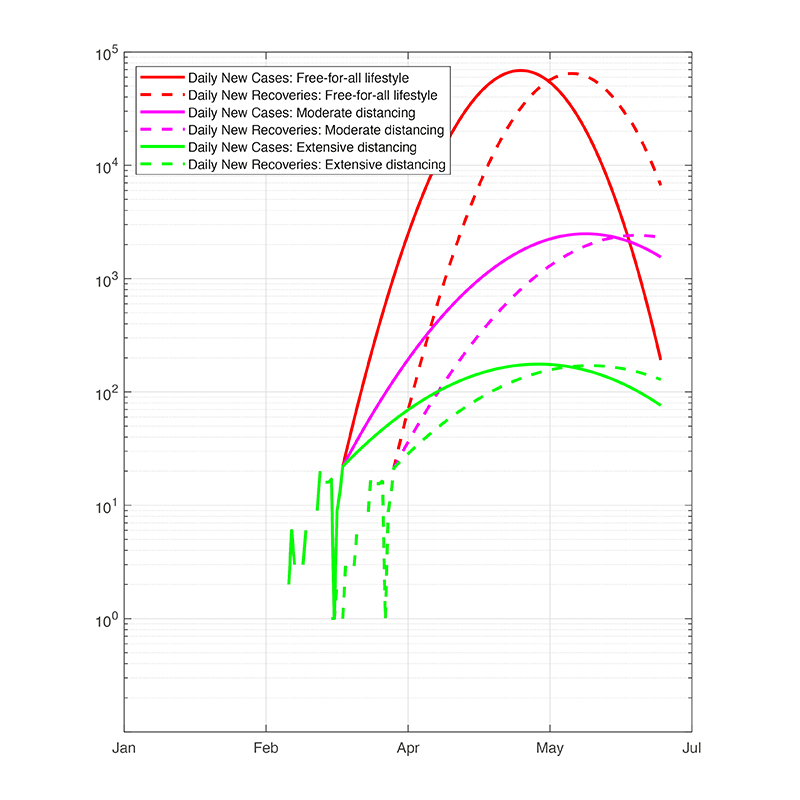
COVID-19 in Lebanon: Inflection point after mid-April.
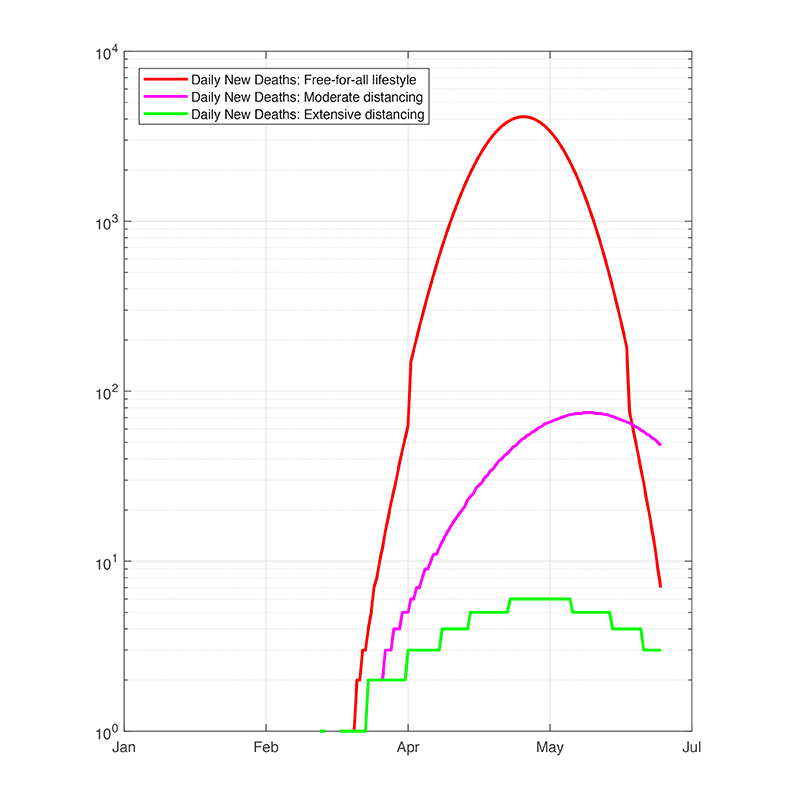
COVID-19 in Lebanon: Extreme social distancing can save 150,000 lives in Lebanon.
This forecast indicated that the social distancing extreme measures are the most effective, including the ‘stay at home’ policies, the isolation of regions/cities, closure of schools and universities, self-quarantine and community quarantines, cancellation of mass gatherings, limitation of public transportation, workplace closures, travel restrictions, etc. Extreme measures implied the simultaneous implementation of these policies.
Medications and Treatments for COVID-19
In a wide-ranging interview, Clinical Associate Professor of Pharmacy Practice in Infectious Diseases Hanine Mansour (PharmD ‘02), and Clinical Assistant Professor of Pharmacy Practice in Critical Care Yara Mary Kuyumjian (PharmD ‘14) answered fundamental questions on the pharmaceutical side of COVID-19.
The questions tackled the kind of treatment that COVID-19 receive at the hospital, the latest in the race to find effective medication in the treatment of the virus, and what procedures are adopted for researching already available medicines.
Drs. Mansour and Kuyumjian also worked with critical care and infectious diseases physicians Drs. Fayez Abillama, Khalil Diab, Jacques Mokhbat and Rola Husni on developing a protocol for the treatment and management of COVID-19 patients at LAU Medical Center-Rizk Hospital.

